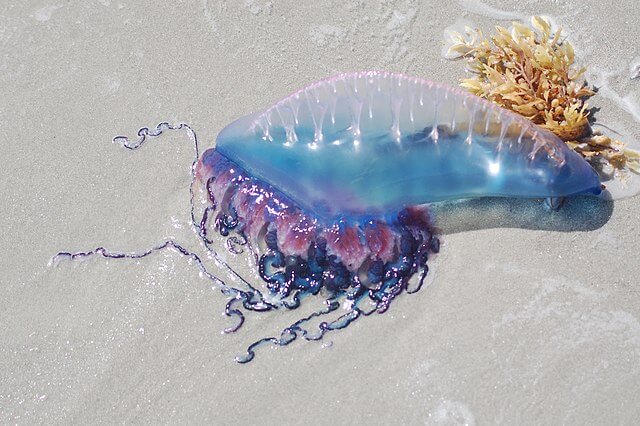
Increased occurrences of larger tropical sea creatures washing up on UK beaches are anticipated due to climate change, warns a marine expert.
The recent discovery of a Portuguese man o’ war on Porth Dafarch beach, Anglesey, highlights the trend.
John Whitaker, who stumbled across the creature on a dog walk, said it was the first he had ever seen.
“I had to make sure the dog didn’t get his nose too close,” said Mr Whitaker.
“It’s the first time I’d seen one up here, usually the water is too cold.”
Although Anglesey Sea Zoo notes previous instances of such creatures washing ashore, this specimen was notably larger.
Frankie Hobro from Anglesey Sea Zoo emphasises that while Portuguese man o’ wars are not lethal to humans, caution is advised.
“We do occasionally see Portuguese man o’ war washed up, this one looks like it’s a little bit bigger than the ones we’ve had in the past,” she said.
“Sea temperatures just now are starting to drop a little bit.
“They were at their highest a month ago and with the changing weather patterns increasing overall sea temperatures all around the UK we are likely to see more of these species that are considered to be tropical – not just more often but larger as well.”
Portuguese man o’ wars live on the surface of the water and they are a type of animal that is made up of a colony of organisms working together.
Often mistaken for jellyfish, these siphonophores are affected by changes in water temperature.
“They are quite obvious even from a distance,” added Ms Hobro.
“They have this very large float on the surface and the tentacles can actually go down to one, two or even three metres (3 to 10ft) in length underneath them in the water.”
“While I was working in the tropics, several years before I came here and bought the business it was this classic scenario where it was being washed around in the surf.
“I was standing in the surf and it wrapped itself around my ankle.
“It was very painful, it takes several weeks to recover from the marks of the sting that it leaves, it’s not pleasant.”
——————————————————————————
At Natural World Fund, we are passionate about stopping the decline in our wildlife.
The decline in our wildlife is shocking and frightening. Without much more support, many of the animals we know and love will continue in their decline towards extinction.
When you help to restore a patch of degraded land through rewilding to forests, meadows, or wetlands, you have a massive impact on the biodiversity at a local level. You give animals a home and food that they otherwise would not have had, and it has a positive snowball effect on the food chain.
We are convinced that this is much better for the UK than growing lots of fast-growing coniferous trees, solely to remove carbon, that don’t actually help our animals to thrive.
This is why we stand for restoring nature in the UK through responsible rewilding. For us, it is the right thing to do. Let’s do what’s right for nature!
Donate today at https://naturalworldfund.com/ and join in the solution!

